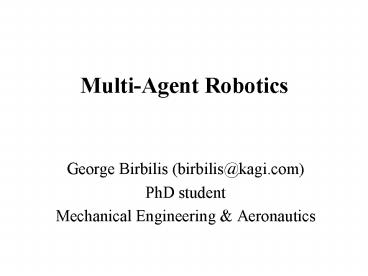Multi-Agent Robotics PowerPoint PPT Presentation
1 / 10
Title: Multi-Agent Robotics
1
Multi-Agent Robotics
- George Birbilis (birbilis_at_kagi.com)
- PhD student
- Mechanical Engineering Aeronautics
2
Agent
- A software/hardware entity (any combination)
- Has a role, a service to perform, a goal to
fulfil - Perceives (via sensors) changes in its
environment and reacts to them (via actuators)
causing more changes to it - Can be proactive (take initiative to modify its
environment, while seeking a goal state) - Is interactive and social (with human or
non-human agents) - See related presentation and other material at
- http//www.mech.upatras.gr/robgroup/agents
3
Component
- Component black box with an input (may be gt1
bit), an output (may be gt1 bit) and a function
f(input)-gtoutput
Component f(input)
Output (gt 1bit)
Input (gt 1bit)
Black box dont care how it works internally,
as long as it applies its published function to
the input it is given and provides the result on
its output
4
System
- A set of interconnected software / hardware
components - Component/Parts inputs connected to outputs in a
static (fixed) or dynamic (auto-reconfigurable)
topology/graph - Can have feedback (loops) in the connections
graph (e.g. amplifiers) - Can be seen as a coarser component / black-box,
with its own input, output and f(input)-gtoutput
function - Constituent components cooperate in order to
perform the collective function
f(input)-gtoutput of the system
5
Multi-Agent System
- A group of cooperating agents that try to perform
a collective function, or - a group of competing agents that may reach a
dynamic equilibrium (system reacts fast to
changes in the equilibrium) - Can be seen as a coarser Agent, having sensors
(system input), actuators (system output) and
seeking to do a role/service/goal - The grouped agents are considered to be system
components - Part of the sensor actuator networks may be
exposed by the system as its own inputs/outputs,
or used internally for interaction of connected
(talking) parts (agents)
6
Agent-based modeling
- Modeling a system as a Multi-Agent one
- Identify systems service/goal, its role inside a
bigger system / workplace - Identify discrete system parts and componentize
them (define inputs, outputs and function) - Define system input (sensors), output (actuators)
and role (input-gtoutput function, reaction to
input changes). Using as system input and output
the inputs/outputs of some of the systems parts
(I/O interface) - Define parts topology and interactions with each
other (usually as a cellular automaton, defining
discrete states and state transitions via message
exchange)
7
Manipulators
- Multi-Body physical system
- N independently moving joints, a N-dof system
- Joint constraints
- Link chain (input link ? joint ? output link)
- base?link1?joint1?link2??linkN?jointN?link(N1)?t
ool tip - Force/torque feedback chain
- Input??base??joint1????jointN??tool tip??Output
- Robot workspace all physical configurations
- Non-free workspace configurations colliding with
obstacles - Free workspace Robot workspace Obstacles
8
Manipulator multi-agent model
- Each joint considered an Agent
- Each joint has an input and an output
- Can sense current or incoming collisions on its
output link and notify previous and next joint - Can propagate collision messages received from
adjacent joints up and down the link chain - A highly redundant manipulator can follow tool
tip trajectory like a snake (Maciejewski and
Klein 1985, see Hwang/Ahuja Motion planning
survey, p.268)
9
Road trains
Trains with no tracks, made up of many wagons
following a pulling track. Wagons seem to follow
smooth curve of tracks motion,
see http//www.adams.com/news/events/userconf/eur
o/1998/euc98_28.pdf
10
In progress
- Building 2D space with obstacles and manipulators
in Microsoft .NET (using Visual Basic.NET) - Manipulator object hosting collection of Joint
objects interconnected via Link objects - Try to solve redundant planar manipulator seeking
points inside a toroid having a small opening for
manipulator entrance. See Aspragathos Hewit
1983, Kinematic Control of a Planar
Manipulator with Access Constraints

